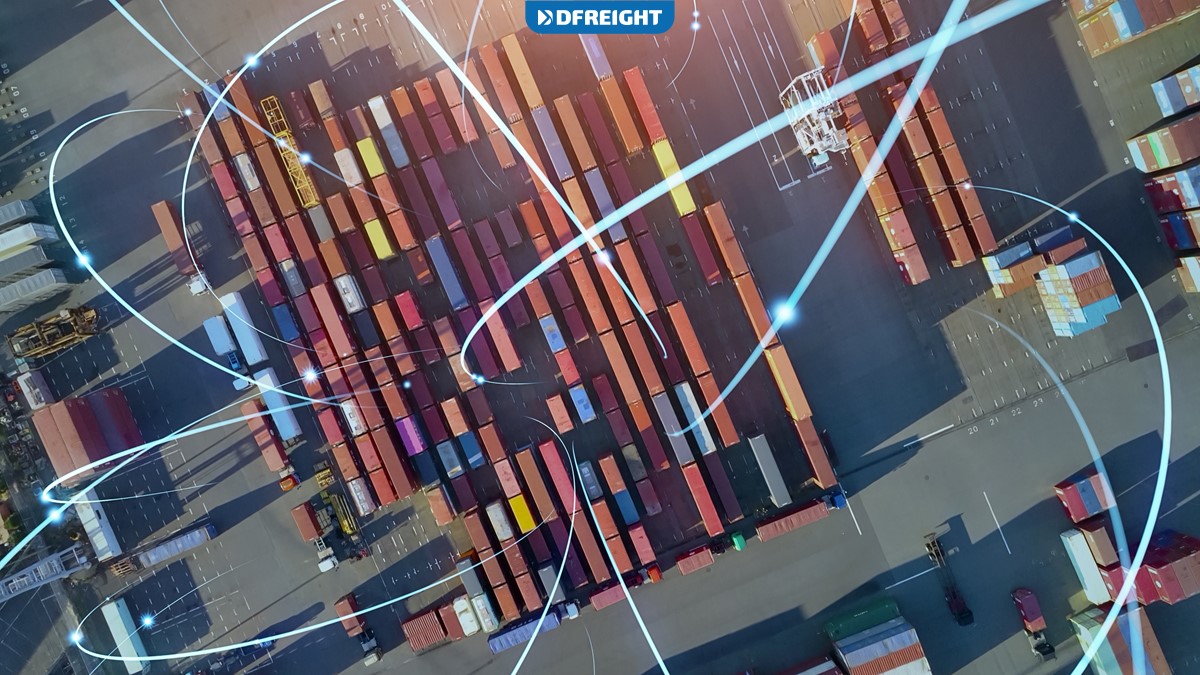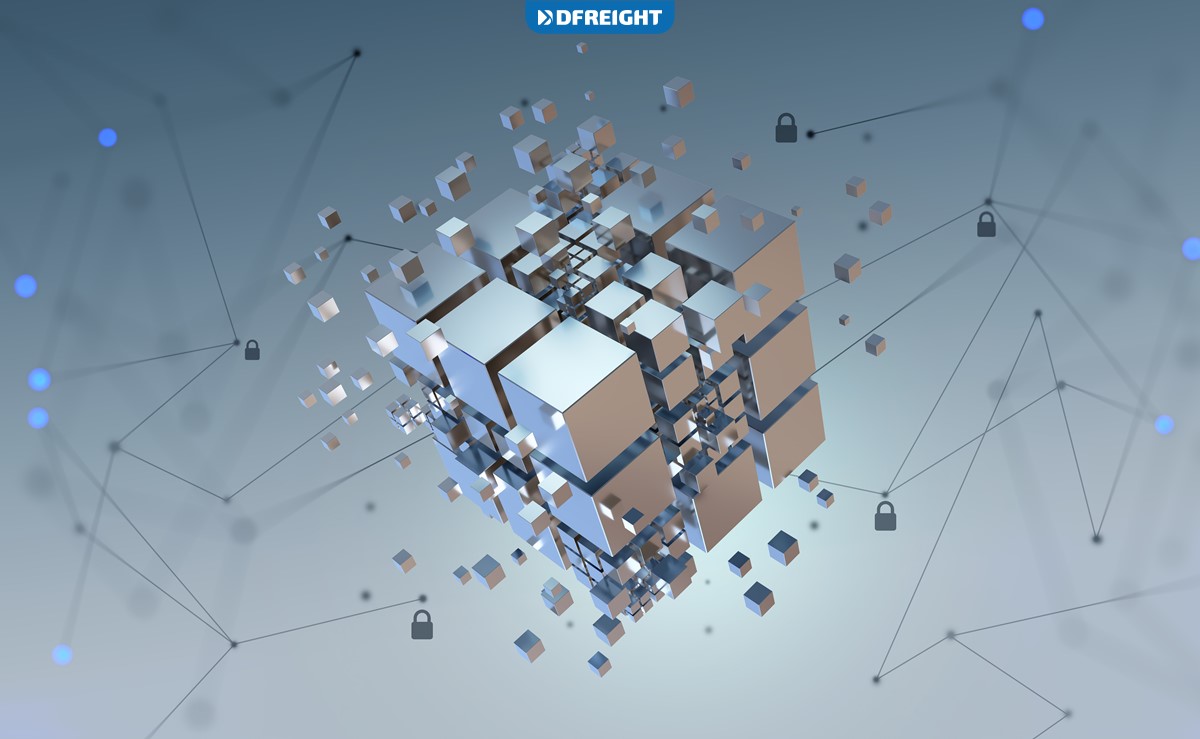“Blockchain” has created a buzz in the world of technology over the past years. Everyone is talking about “Bitcoin” and other digital currencies with incredible thrill and confusion. However, this technology has a lot more to put forward besides the stirs it has created in finance and banking. It can revolutionize the world we live in in various aspects, including all we do in the transportation and supply chain realm. Our future logistics will depend on technologies like blockchain; if we fail to stay ahead, we’ll fall behind the competition. Hence, in this post, we’ll provide you with an overview of blockchain and its massive benefits in logistics. Read on and excite yourself!
Table of Contents
What Is Blockchain in Brief?
Usually, when someone hears the word “blockchain,” they immediately think of terms like Bitcoin, cryptocurrency, and high technology. At this point, you could ask yourself, “How might this technology help improve the global logistics operation?” The answer is to use “Distributed Ledger Technology” (DLT) in supply chains.
A blockchain is a distributed database that allows direct transactions between two parties without needing a central third party. The underlying technology will enable users to verify and record these transactions, creating a digital ledger of all activity. This database constantly grows as “completed” blocks are added with a new set of recordings. Each block contains a cryptographic hash of the previous block, a timestamp, and transaction data. Bitcoin, the first and most well-known cryptocurrency, is based on a blockchain.
Why Blockchain Matters
Blockchain is so important because it allows for secure, decentralized transactions. With this technology, there is no need for a third party to verify or approve a transaction. This means that transactions can be completed much faster and with far lower fees. Additionally, blockchain provides a high level of security, as it is tough to hack or tamper with a blockchain.
How It Works
As mentioned, blockchain is used as a distributed ledger for various applications, such as tracking ownership and provenance of assets, recording votes in an election, or managing supply chains. It is often described as a digital ledger because it allows transactions to be recorded and verified chronologically. This is done using a tamper-proof mechanism, such as cryptographic hashes, that makes it very difficult to alter the contents of a block once it has been added to the chain.
Because each block is linked to the block that preceded it, it is also very difficult to delete or alter an earlier block in the chain without having to update all of the blocks that come after it. This is because a blockchain’s entire history is stored in each block, and each block is chained to the one that came before it. This makes the technology an attractive option for applications that require a high degree of financial or organizational trust, such as banking, supply chain management, or voting systems.
Top Characteristics of Blockchain
Decentralization: Blockchain requires no central authority or intermediary to approve or oversee transactions. Instead, transactions are approved by the network of computers (known as nodes) that maintain the blockchain. This decentralization means that no one entity can control or manipulate the blockchain, making it incredibly secure.
Encryption: It helps ensure data security. Using cryptographic algorithms, the technology can provide a high level of protection for data stored on the network. Cryptography can also be used to protect data that is transmitted over the network. Blockchain uses public and private keys to encrypt and decrypt data. Public keys are used to encrypt data, and private keys are used to decrypt data. Using these keys, the blockchain can ensure that only authorized users can access data.
Immutability: The term “immutability” is used in computer science to describe an object that cannot be modified. This is a key characteristic of blockchain technology. Once data is written to a blockchain, it cannot be changed. This makes the technology an ideal platform for storing data that needs to be secure, such as financial transactions.
Consensus-Based Validation: All parties involved in the transaction must agree to and validate it. Therefore, the consensus-based nature of this technology is one of its qualities that improves trust amongst the various critical actors participating in the process.
Smart Systems: A smart contract is a digital contract stored on a blockchain and used to automate transactions between two parties. They carry out operations like payment transfers and ownership changes. Because they don’t need any middlemen, these systems significantly speed up the process by automating it and cutting down on time.
Key Benefits of Adopting Blockchain in Logistics

Adopting this technology in logistics and smart shipping has many potential benefits, including improved transparency, traceability, and security. Blockchain can also help to streamline supply chain management by providing all stakeholders with access to the same information in real time. Here are some of the most significant ones:
1. Supply Chain Transparency and Traceability
Due to the technology’s distributed nature, supply chain data can be stored on a blockchain and accessed by all parties in the supply chain. This data can include information about the origin of goods, their journey through the supply chain, and their destination. It can also be used to track the transport of goods through the supply chain in real time, which allows for better coordination and communication between all parties in the supply chain. This traceability can help to identify issues and problems in the supply chain and can also be used to track the provenance of goods.
2. Efficient Inventory Planning and Management
This technology can be used in inventory planning and management to streamline the process and make it more efficient. By using blockchain, all supply chain stakeholders can access the same information in real-time, which can help reduce errors and improve decision-making. In addition, it can help to track inventory levels and ensure that items are always in stock, which can help to prevent disruptions in the supply chain.
3. Provenance Validation and Quality Assurance
Blockchain can be used to validate the provenance of goods and ensure that they meet quality standards. By tracking the origin of goods, businesses can be sure that they are receiving goods that are as described and meet their quality standards. In addition, the technology can be used to track the progress of goods through the supply chain, from manufacture to delivery, which can help ensure that goods are not lost or damaged in transit.
4. Enhanced Operational Efficiencies
Since employees exchange various documents, execute payments, settle tariffs, transfer ownership, etc., there are concerns with clerical errors, time consumption, and fraud occurring inside the supply chain. The smart contracts provided by blockchain are the answer since they can take over all these tasks and enhance the corporate workflow procedures.
Challenges of Implementation in the Logistics Industry
The challenges of implementing this technology in the logistics industry are many and varied. Perhaps the most significant challenge is the need to overcome the trust issues between different parties in the supply chain. For the technology to be effective, all parties must be able to trust the data that is being recorded on the blockchain. This is not always easy, mainly when those parties are located in different countries with different legal systems.
Another challenge is integrating the technology with existing systems and processes. This can be a complex and time-consuming process, mainly if the current systems are not designed to be compatible with blockchain.
Finally, this technology is still in its early stages of development, and there is a lack of standardization around how it should be used. This lack of standardization can make it difficult for different parties to communicate and work together effectively.
The Future of Blockchain in the Logistics Industry
In the future, this technology will continue to revolutionize the logistics and supply chain industry. By providing a secure and transparent way to track and manage shipments, blockchain will help businesses optimize their operations and improve efficiency. In addition, blockchain-based smart contracts will enable businesses to automate many of their processes, further reducing costs and enhancing efficiency. As the technology matures, we can expect to see even more innovative blockchain applications in the logistics and supply chain industry.
DFreight Explores the Future of Shipping with Blockchain and Big Data
Here, at DFreight, we are exploring the future of digital shipping by utilizing cutting-edge technologies like blockchain and big data to streamline supply chain management. By developing a comprehensive digital freight forwarding platform, we hope to create a more efficient and secure way to track shipments throughout the supply chain. Moreover, we are utilizing big data to gain insights into global shipping trends and optimize operations. By harnessing these front-line technologies, DFreight is positioning itself as a leader in the future of international shipping.
FAQs
What is blockchain?
It is a distributed database that allows direct transactions between two parties without needing a central third party.
What are the key benefits of blockchain in logistics?
It can help to streamline supply chain management by providing all stakeholders with access to the same information in real time. This can improve coordination and communication between all parties in the supply chain, and can also help to prevent disruptions in the supply chain. In addition, it can help businesses to automate many of their processes, further reducing costs and enhancing efficiency.
What challenges does blockchain face in the logistics industry?
The challenges include the need to overcome trust issues between different parties in the supply chain, integrating the technology with existing systems and processes, and the lack of standardization.














